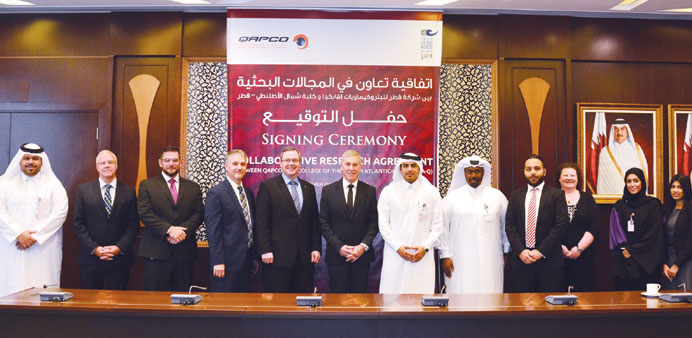In a new partnership, Qatar Petrochemical Company (Qapco) and College of the North Atlantic – Qatar (CNA-Q) have agreed to undertake research into the use of augmented reality for training oil and gas sector students.
Augmented reality (AR) allows multiple types of information to be superimposed over what one sees in the real world through tablets, phones or glasses.
With AR, instructions or processes to perform tasks can be displayed visually, rather than having to read through a manual and can greatly reduce time needed for task completion and human error.
The research project would involve the identification of approximately three to five critical tasks commonly performed on one piece of equipment by entry-level technicians at CNA-Q. Customised augmented reality learning objects would then be developed that support competency in performing those tasks.
The learning objects would be tested using volunteer students from CNA-Q’s Engineering Technology and Technical Preparatory programmes. In this stage, qualitative data would be collected from learners to determine attitudes towards training using augmented reality-based learning objects.
Dr Mohamed Yousef al-Mulla, vice-chairman and CEO of Qapco, described the new technology as remarkable, stating: “In conjunction with CNA-Q, we wish to investigate the potential of augmented reality to better prepare industrial trainees for the tasks and environments in which they will be working in industry. We believe that augmented reality can increase the level of critical competencies needed for employment, such as a technician in Qatar’s oil and gas sector.
“We are first adopters in the use of augmented reality training and performance support solutions in the oil and gas sector in Qatar and in the GCC region and are excited about this new technology as Qapco would benefit from a better prepared trainee workforce and from exposure to performance support and training solutions that could potentially be integrated into our own workplace training programmes.”
Dr Ken MacLeod, president of CNA-Q, thanked Dr al-Mulla for his support with the project and described the potential benefits, saying: “This project will have a number of benefits for all stakeholders – CNA-Q, Qapco and, most importantly, our students. CNA-Q will gain a better understanding of the potential for AR-based training and its application in our blended learning solutions. As a result, Qatari students will benefit from an enhanced, 21st century learning experience that is not only completely safe, but taps into their preferred learning style and is more engaging and motivational.
“Additionally, because we will be developing augmented reality learning objects that are customised to Qapco’s equipment and procedures, Qapco technician trainees will be better prepared for their careers in the oil and gas sector.”

Qapco and CNA-Q officials at the signing ceremony.
